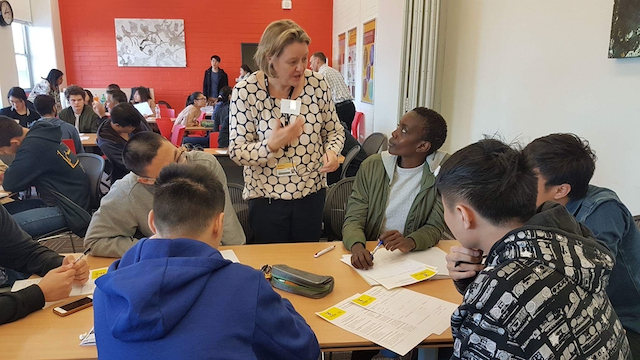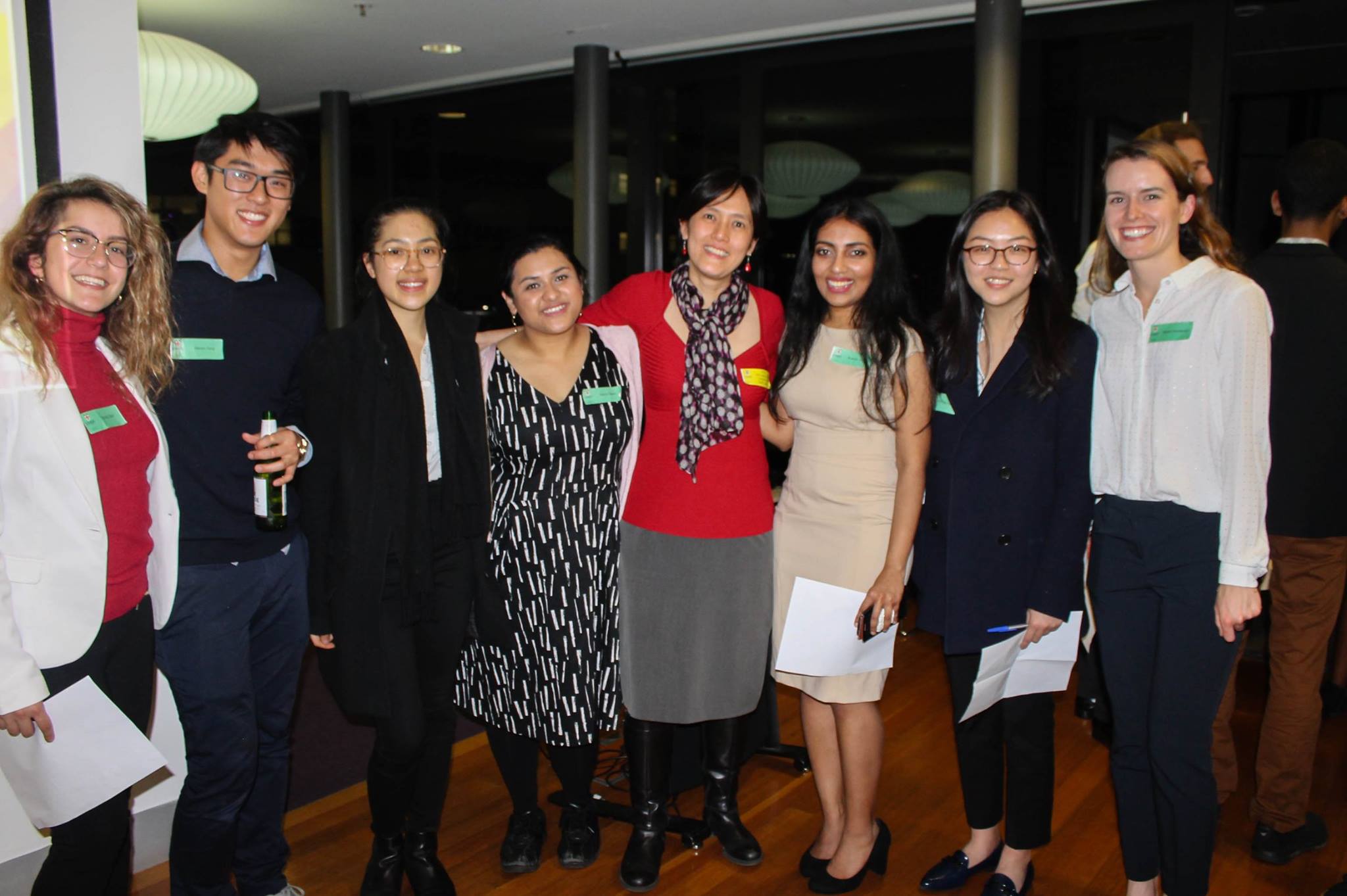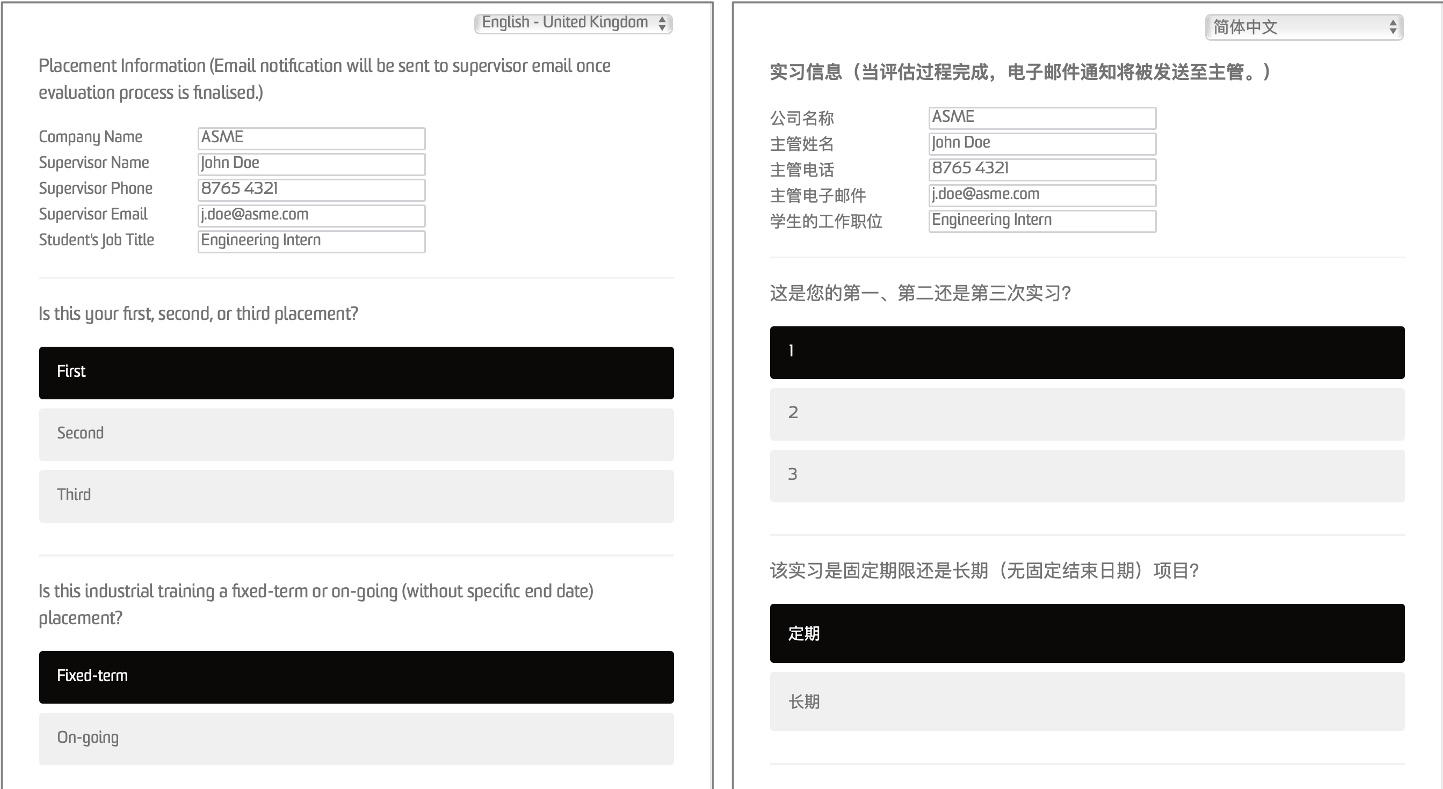Industrial Training is an essential Work Integrated Learning (WIL) component of all UNSW Engineering degree programs. Students have a better learning experience when they can secure quality placement, but they lack the skills and network that is required to obtain such a placement. Moreover, with more than 16,000 socially, culturally and linguistically diverse students who are enrolled in 165 specialisations, of which approximately 4,000 will be seeking industrial placement each year, student skill development and WIL support at UNSW Faculty of Engineering have to occur at an unprecedented scale.
From 2014 to 2018, as the Coordinator for UNSW School of Chemical Engineering’s Industrial Training Program, I implemented innovations that spanned the entire student lifecycle to prepare the students for their work placement, including evaluating student learnings at scale and in a sustainable manner. In partnerships with student societies and student success units, I convene workshops and activities which raise the students’ understanding of the nuances of the engineering discipline, increase their professional network and highlight future career pathways. I create communities which instilled peer support, mentoring and develop employability skills that help students secure quality industrial training placements.
In 2019, I continued to work with stakeholders to ensure our Industrial Training Program meets Engineers Australia’s professional accreditation requirements and complies with the Australian Higher Education Standards Framework and the Fair Work Act. I led a UNSW Digital Uplift project to develop digital tools to administer the Industrial Training Program at scale and capture the students’ experience while on placement. Through dialogues and feedbacks, I inspired engineering students to transfer the skills and knowledge learnt at university to the real world and to develop their technical and professional skills. The authentic learning experience enhances my students’ employability and network in their chosen field of study, and they gain the opportunities to experience what their future career may hold.
"Dr May Lim is a proactive and passionate Academic. Collaborating and guiding students to interact with industry and actively seeking out opportunities for industry engagement. I have witnessed the admiration students have, her approach is one of support and guidance. Dr May Lim strives for continual dynamic improvement by engaging with the Faculty and connecting people to create better outcomes. ” – Michele Hannon, Industrial Training Manager, UNSW Faculty of Engineering, in my nomination for the 2017 President Award for Excellence
Design 1 • Designs curricula, learning activities and resources for Industrial Training
I provide information on the Industrial Training Program's procedures and expectations, and on how to access university and external support services for Industrial Training. I advise the students that it can take several years to acquire all the skills they need. I encourage them to make full use of the available services and participate in activities that will develop their professional and employability skills.
I designed and convened workshops which help Stage 2 Chemical Engineering students develop an understanding of their discipline. This includes current and future career paths in industry sectors which employ chemical engineers, how to engage successfully with industry representatives, how to target their resume and cover letters to different industry sectors within the discipline, and how to address the selection criteria. Students also learn about the intricacies of the job search process, what their rights and obligations are, and how to find the placement that best matches their interest, values and requirements. These workshops are important as students are often unaware of the discipline-specific skills and knowledge required to secure a quality placement, especially if they are students from regional Australia, international students (a third of the cohort), students who are first in the family to attend university, students with a disability, or students from lower socioeconomic backgrounds.
“Thank you so much for your encouragement and support during my job hunt. You have opened many doors for me and given me the push I needed to step through them. I look forward to working with Interface over the summer.” – First in the family student
“I would just like to thank you for helping me get the ball rolling in the search for industrial training. I have managed to secure a traineeship with Sydney Water and I am really enjoying it so far.” – Student from regional Australia
“I wanted to thank you. I applied to a P&G role and just got invited for an interview. I really think you helped my develop solid Cover Letter writing skills because I have been successful in the first stage of the application for each job I have applied to.” – International student
“I just wanted to say thank you for reassuring me that things would be alright. The desalination plant has decided to take me onboard as a summer intern and I couldn't be happier.” – Student with disability
I also worked in partnership with a student and representatives from UNSW legal, finance and public relation departments to develop an Industrial Training Guide for Employers which informs all stakeholders about the industrial training requirements and processes. This include Australian workplace regulations, health and safety regulations, visa and work permits requirements and insurance. Feedbacks received from students and placement providers indicate the information pack reduced the confusion around the Industrial Training process and simplified the communication between external industrial training providers and the student/institution. I also worked to ensure a single point of administrative contact for matters related to industrial training; this prevents misinformation and ensures matters related to industrial training (e.g. queries, opportunities) are actioned quickly and efficiently.

Design 2 • Engaging students as partners to develop support for professional skill development
Prior to 2014, there was little opportunity for students in Stage 1 to 3 of the UNSW Chemical Engineering degree program to meet with representatives from the chemical industry and develop their networking skills in a setting where they feel secure and comfortable. A reason for that is many industrial training providers are small to mid-size businesses that do not have the resources to attend the university career fair or are located in a regional area or interstate. Moreover, the engineering schools do not have the human resource required to organise and market these kinds of event.
To bridge this gap, I recruited UNSW’s Chemical Engineering Undergraduate Student Society and Women in Engineering Society as student partners to organise events that improve the students’ awareness of the industrial training process and requirements, as well as their network and employability skills. These events include panel sessions, industry presentation on campus, industrial site visits, attendance at on and off-campus career fairs, student-industry social events (e.g. trivia nights, industry cocktail nights) targeted at students in Stage 2 and 3 of the engineering degree program.
I also built peer supports and mentoring into the Industrial Training Program. Senior students, recent graduates, staff and industry representatives are available to guide or provide advice to current students on how to make the most out of these events. I also mentored student societies on their engagement with our professional body and the industry itself. For example, I guided the President of the Chemical Engineering Student Society on how to negotiate and steer the conversation with the Institute of Chemical Engineers so that the professional body would sponsor and provide in-kind support for the societies’ Industrial Training related activities. I connected the Women in Engineering Society with industrial mentors and helped them develop their inaugural Industry Mentoring Program, now in its fifth year.
Because the students have the most to gain from these initiatives, they strive to ensure the events are successful. Through mentoring, dialogues and feedbacks, my students develop skills that not only support them in their future careers but give them the confidence to collaborate with each other and undertake leadership roles on School/Faculty boards and committees. The students found the opportunities to network and develop their skills to be extremely valuable. Many students return years after they have graduated to help the current students as a way to pay it forward.
“I want to thank you for all your help, from teaching me how to network at career expos to giving me connections in the water industry. I really appreciate the time you took to help me and am excited to start my internship.” – Stage 2 Engineering Student, 2017
"Over that year my resumés, cover letters and interview skills have improved exponentially. I reiterate that if you ever need assistance regarding helping younger students out with advice on how to go about finding IT I am here to help.” – Stage 4 Engineering Student, 2016
"Put me down as a mentor and whatever I can do to give back I am always ready!.” – UNSW Alumni, 2017
"Thanks so much for the opportunity (to attend the 2018 National Students as Partners Roundtable). I now realised the importance of (student leadership) in Faculty and Academic Boards." – B. Ranasinghe, Student as Partner and elected member of the 2019 UNSW Engineering Faculty Board, 2018

Design 3 • Design aligned assessment tasks and marking rubrics for Industrial Training
UNSW Faculty of Engineering previously lacked a rigorous way to assess and evaluate students’ learning from their industrial training placement.The number of placements each year, of which almost 50% are international placement, compounds the problem. In 2019, I applied for and was granted $30,000 in funding from UNSW Digital Uplift Program to develop the multi-lingual Work Integrated Learning online app (WILSOn). Available in six languages, WILSOn allows industrial training providers (including oversea providers) to evaluate and provide feedback on the student's performance while the student is on placement. The app also enables the Faculty to monitor, for the first time, the students’ wellbeing for the entire duration of their placement.I captured the students’ cognitive and behavioural competencies during their placement via reflective writing. I developed a set of rubrics and marking guides for placement providers to assess the students’ learning. The rubrics, derived from the Association of American Colleges & Universities’s Integrative and Applied Learning VALUE Rubrics and Engineers Australia’s Stage 1 Competency Standard, standardises and simplifies the assessment and feedback to the students for the whole faculty. The information collected is also used to certify the students’ professional skills attainment while on placement in a university-wide micro-credentialing project.

Design 4 • Provides students with constructive feedback on their employability skills development
In my role as the Coordinator for UNSW School of Chemical Engineering’s Industrial Training Program, I mentored and provided feedback to students re their professional profiles and employability skills. I also ensured students can contextualise their industrial experience with their university education and have the confidence and self-knowledge to chart their future career.
"Thank you for the feedback. I greatly appreciate it - being more calm is something I’ll have to work on but this is great to know. I had a great first day at BASF today amazing company and very international. Absolutely stoked." – Stage 3 Engineering Student, 2015
"Thanks for everything over the past 3 years. I’m finally in a position where I’m not scared if I’ll find a job or not.." – Stage 4 Engineering Student, 2019
"My journey at university over the last few years has been a time of immense growth both personally and professionally. I had to completely reinvent myself and adapt to a new culture and jump across numerous hurdles that stood in my way. The advice you gave me throughout those years has been absolutely unparalleled." – Stage 4 Engineering Student, 2019




